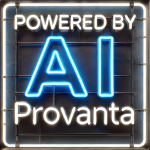Here at Provanta we’re really excited about the positive impact of artificial intelligence (AI) on software development in general and specifically on the process of creating business software solutions.
When ChatGPT first entered the public consciousness in 2022, one of the first use cases to be identified for this revolutionary technology was the generation of software in the form of programming source code.
Since then, many industry figures and AI commentators have been calling the end of software development as we know it today, with AI capabilities evolving to the point where functional systems can be generated by feeding a natural language (e.g. English) specification into a generative AI platform and a complete system will be output with no coding required.
The head of AI chipmaker NVidea, Jensen Huang, along with Sam Altman, head of Open AI, have both recently been quoted as saying the future of programming is the English language.
This may seem far fetched to some, but AI’s transformer architectures such as GPT and Claude have proved very adept at translating between different languages, which is really what we are doing when we code – translating from human natural language specifications into languages the computer understands such as JavaScript, Python, C etc.
AI-assisted development is already the norm
Since GPT 3.5 launched, many software developers have been making some use of AI in their software development practise. Most often this is in form of AI-generated responses from search engines or purpose built coding assistants such as Microsoft’s co-pilot in response to rather narrow prompts. Whatever the specifics, it is probably fair to say that right now we are operating under a programmer-driven approach to software development, one which is improving overall developer productivity through assistance without fundamentally changing the software development methodology that’s been around for years.
AI-first development is possible now
The next step towards fully AI-generated systems is AI-first development, in which specifications are passed to AI to create a system and then the software developer is responsible for tidying up and filling in gaps. This will be a reversal to the current development working practises and will be the first time that customers of the software development industry will experience the huge impact of AI on the process, as timescales and costs start to reduce dramatically.
OpenAI’s latest large language model, GPT-o1, has demonstrated how quickly things are advancing along these lines. Our own experience of generating code with GPT-o1 have shown that an AI-first approach can be taken already. With carefully informed and structured prompting, a full specification can be given to the AI to generate a working system. There are ,of course, short comings to this approach right now but the endgame and the pace of change are clear, while the benefits stated above are already available to those willing to try.
We will begin to see tools offering full blown systems engineering capabilities based around English specification within the next 12-24 months, and we are already working with some vendors lining up these capabilities.
Specifications are the new source code
The switch of approach from code-driven to spec-driven has immense implications for businesses wishing to benefit from software solutions. Software is becoming much cheaper and can be delivered much more quickly. Bespoke AI-generated systems are already replacing off-the-shelf systems as the cost justification equations tip away from configuring off-the-shelf (SaaS) systems towards writing or configuring specifications and having the exact required system generated by the AI. As proof of this look no further than Klarna’s recent decision to ditch the Saleforce platform in favour of its own in-house AI-generated systems which are cheaper and can be delivered more responsively.
In the future it won’t be as important or impactful to have a complete specification up-front. Instead it will be easy to generate systems iteratively based on building a spec and amending it until the generated system does everything that’s required. Maintenance can be carried out much more quickly than today due to having only one customer per code base and hence less interdependencies conflicting the delivery schedule. AI can run this process too, with the spec becoming a living document that evolves with the business through the system lifecycle.
These are just a few of the many benefits of the coming revolution and the implications are mind-boggling. We’ll be covering these in more detail in future articles but until then Provanta is focused on bringing you the benefits of AI-driven software that are available now – faster, cheaper, better delivery.
If you have a project or idea that you’d like to discuss then please don’t hesitate to get in touch.
